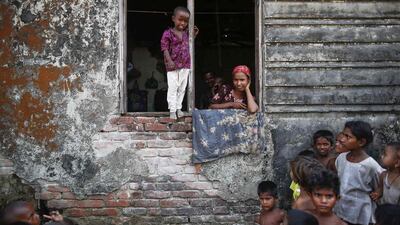Tomorrow, an extraordinary meeting of the Council of the Foreign Ministers of the Organisation of Islamic Cooperation will convene in Kuala Lumpur. Held at the request of the Malaysian government, the gathering will discuss the plight of the Muslim Rohingya minority in Myanmar, who have been subject to what many – from a senior official at the UN Refugee Agency to, more recently, Malaysia’s prime minister Najib Razak – have referred to as “genocide” or “ethnic cleansing”.
The meeting’s mission: to work out how to persuade Myanmar’s government to allow humanitarian aid in to Rakhine State; address the root causes of the violence; forge a dialogue to ensure displaced Rohingya can return to their homes “in safety and dignity”; and discuss how to help the more than 120,000 “displaced and refugee” Muslims in the country.
The OIC gathering could not be more timely, nor the need for international pressure greater. For this is a spotlight Myanmar’s government would rather avoid altogether. It would have us believe that what has been going on in Rakhine State has been a mere security action, a necessary response to the killing of nine policemen in a series of attacks on guard posts along the border with Bangladesh last October.
A government-appointed commission has already – ludicrously and predictably – issued an interim report this month saying that the presence of mosques and religious scholars among “the Bengali population” (they cannot even bring themselves to say the world “Rohingya”) are “proof that there were no cases of genocide and religious persecution in the region”.
The Advisory Commission on Rakhine State chaired by former UN secretary-general Kofi Annan, meanwhile, is not due to submit its final report and recommendations until the second half of this year. That’s plenty of time for the murders, rapes and razing of villages to carry on, on top of the decades of repression and denial of citizenship to a people who have never known another home.
Yes, the situation is complicated by the fact that no party or politician in Myanmar gains anything politically from helping the Rohingya – indeed, given the racism and Islamophobia rife in the Buddhist majority, they have plenty to lose. De facto leader Aung San Suu Kyi is not entirely to blame. There may be a cruel irony in such atrocities being perpetrated under the rule of the Nobel Peace laureate, but the 2008 constitution reserves to the military the right to appoint the ministers of home affairs, border affairs and defence.
The generals cared nothing for human rights during their long decades of dictatorship. There is little reason to suppose their hearts have softened because they allowed a democratic opening; they knew that was necessary to ease sanctions that threatened the long-term survival of both the armed forces’ position and their economic interests.
Some suggest, therefore, that international pressure on Myanmar could be counterproductive. Ms Suu Kyi can’t do anything. The military doesn’t want to do anything. And too many locals are enjoying the orgy of killing and destruction anyway.
It may be necessary for the Myanmar government and military to be allowed to save some face. Constructive criticism and unconditional offers to help may be more useful than trying to paint the country as a pariah nation once again.
But what has happened – and is still happening – must be acknowledged. The situation is dire and must be addressed immediately. While Mr Annan’s commission deliberates, the terrible persecution of the Rohingya will not be put on hold. It is vital that international pressure is ramped up so that, ultimately, Myanmar sees that it is in its own interests to act.
If this can be achieved at least partly through the intervention of the OIC, so much the better. A body that represents 57 countries and around 1.7 billion people, the OIC has always had enormous potential.
It has, however, also been criticised as ineffectual – long on talk, short on action – while simultaneously being attacked by right-wing Islamophobic conspiracy hacks as an instrument of extremism, as ridiculous as that may be.
This extraordinary meeting is a chance for the OIC to prove itself, to show that it really can bring the Ummah together to act as one in the service of a Muslim minority, which it is duty bound to do, according to its charter.
Faith in the old post-Second World War institutions and dominant ideologies is seriously weakened. That vacuum is already being filled by resurgent states wishing to impose their rules unilaterally on their perceived spheres of influence.
But the gradual retreat of the West from its global role – which will surely continue, as there are few with the confidence to aspire to reclaim that dominance – also means there is space on the stage. There was a time in the past when “third” groups, such as the Non-Aligned Movement, insisted that countries – especially developing ones – need not fit into the binary straitjacket of capitalism or communism.
While the NAM declined into near-irrelevance, there is no denying that leading members, such as the Yugoslavia of Tito, Nehru’s India and Sukarno’s Indonesia, did navigate their own paths and carry sufficient weight to influence others.
Similarly, in this multipolar age, there is an opening for a group such as the OIC. Can it rise to the challenge? We shall see, but what an achievement if the Ummah could speak as one and say loudly to the world of the Rohingya tragedy: not on our watch.
Sholto Byrnes is a senior fellow at the Institute of Strategic and International Studies, Malaysia


